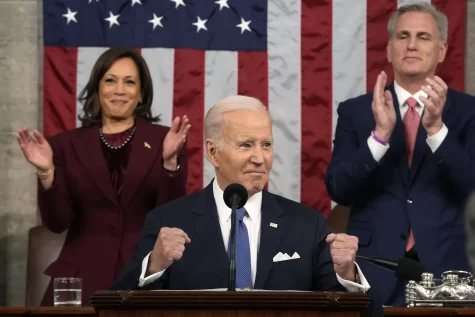WGS Film Festival tackles taboo topics
Female orgasm and the history of the vibrator were both hot topics at the 27th Annual Women and Gender Studies Film Festival on Saturday, which over one hundred people attended.
The theme of the festival was “From Hysteria to Disorder: Manufacturing Disorders of Female Sexual Desire,” a topic that the film festival hasn’t discussed in the past. The two films shown throughout the day were “Passion and Power: The Technology of Orgasm” and “Orgasm, Inc: The Strange Science of Female Pleasure.”
Jo Reger, the director of WGS, said they chose these topics after previewing the films last fall. She liked that the films challenge stereotypes about women and gender roles in a way that isn’t often seen.
“This idea of, ‘Why do we think about women in a certain way as sexual beings? What’s the history of that and how we are treating them now?’ Those films just fit together and answer those questions so beautifully,” Reger said.
The first film, “Passion and Power, ” examined the history of the vibrator and its invention in the 19th century, as well as female orgasm over the past 2,000 years.
“It’s about the development of this sexual aid that kind of disappears for a while and we forget that this history exists,” Reger said.
Feliece Turner, a senior Women’s Studies major, enjoyed how open and informative the film was.
“I didn’t know the vibrator went back so far in history,” Turner said. “It was funny but at the same time it showed that it’s a serious situation.”
Stacey Brode, a sophomore communications major, said she was liberated by the experience and also found the history of the vibrator intriguing.
“I loved it. Like how they promoted vibrators back in the day. It was really funny to me how they were household items and now there’s a big dilemma about it,” Brode said about the stigma that now seems to surround the device.
The second film, “Orgasm, Inc.,” followed pharmaceutical companies in their quest to develop medication and other treatments for Female Sexual Disfunction, a controversial disorder that can affect a woman’s ability to have an orgasm.
“It is looking at this idea of finding a female Viagra, like there’s a medical way to deal with sexual dysfunction in women,” Reger said. “It takes apart the problems with this approach — that maybe there are other ways we can think about dealing with this idea of a disorder in female sexuality.”
Jason Threlkeld, a senior communications major, said that the film made him question the legitimacy of the disorder that companies were racing to find a pill for.
“I think that was kind of deceiving, how they tried to make up diseases to try to market to people,” Threlkeld said. “It was very much about the business aspect of the medical industry.”
In the film, Dr. Leonore Tiefer argues that there are alternatives to medication for sexual dysfunction, like vibrators, sex therapy and simply talking about the issue.
After both films ended, a discussion was held between the audience and psychology professor Sylvie Lombardo and health sciences professor Patricia Wren. All were encouraged to share their questions, comments and concerns on the topics.
“I think we have such a hard time saying the words vibrator, vagina and orgasm,” Reger said. “I think there’s something good about saying it and talking about it and I think it de-shames all of that stuff. People don’t want to talk about parts of their body, but the more they do, the more comfortable you get. I think it just makes for a better world with much better conversation.”
Turner said that she may even use the topics discussed at the festival for her capstone project.
“I’ve already come up with a few things that I would like to talk about in some of my classes,” Turner said. “This was a fun experience. All the things (WGS) does for Women’s History Month are really cool.”
Reger emphasized that talking about sensitive topics like orgasm and sexuality can help break down stereotypes about who men and women are.
“I think that young girls are extremely damaged by these labels of slut and boys are often encouraged to engage in risky behavior because they ‘gotta be men,'” Reger said. “I think that all of that is really dangerous to us as people. I think these conversations are important. Frankly, if we as adults can’t talk about this stuff, how are going to teach our children to be healthy and have really natural sexualities?”
She said that she was very pleased with the outcome of the event.
To learn more about Women and Gender Studies, visit their website at
www.oakland.edu/ouws











